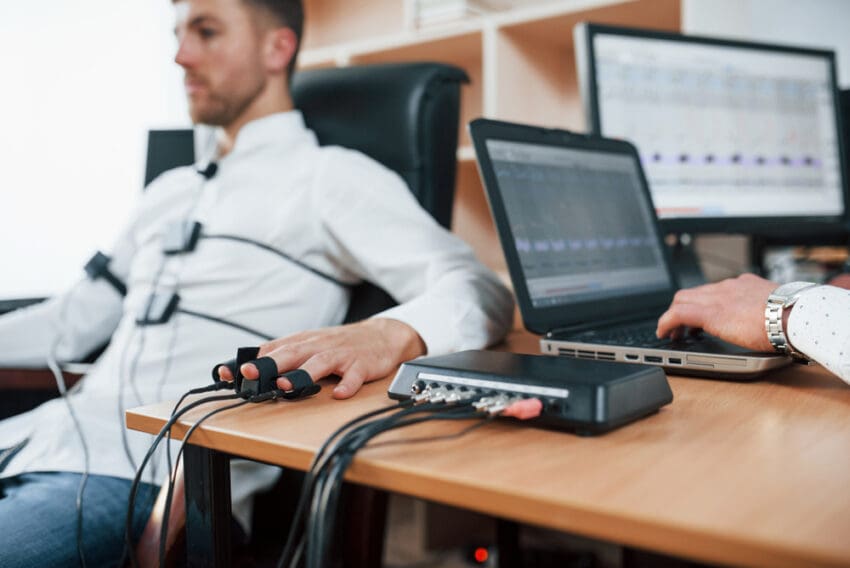
Polygraph Testing: Techniques and Methodologies Used in the UK
First introduced in the 1920s, the polygraph test marked a pivotal moment in suspect interrogation for law enforcement agencies.
This groundbreaking tool provided a way for investigators to evaluate the truthfulness of individuals during questioning. As the science behind the polygraph test has developed over time, new methods and question techniques, such as the Control Question Techniques (CQT) and others, were established to bolster its reliability and precision.
This piece delves into the mechanisms behind these techniques, shedding light on how they contribute to the progression of this investigative tool within the UK context.
A Snapshot of Polygraph History: Tracing Back the Foundations
Since its inception by John Larson, the world of polygraph examinations has undergone major transformations. Figures such as Leonard Keeler have been key to enhancing the effectiveness of polygraph devices and question techniques.
However, it was John E. Reid who shaped the questioning methodology known today as the “Reid Technique”. Developed in the 1950s, Reid’s approach centred around building a high-pressure environment during polygraph examinations, which aimed to extract a confession from the individual being examined.
Although the Reid Technique drew controversy due to some high-profile false confession cases, it also gained recognition within polygraph circles. Today, while Reid’s methodology is no longer widely applied in criminal polygraph scenarios, including in many parts of the UK, his influence in the field of interrogation is undeniable. Present-day examiners often use alternative techniques to ensure a more standardised and ethical approach to questioning while maintaining the objective of obtaining precise information.
Key Questioning Techniques in Modern Polygraph Exams
Contemporary polygraph exams mainly use four questioning techniques, depending on the situation and the examiner’s training:
1. Control Question Technique (CQT): The CQT method employs a blend of relevant and comparison questions. By comparing the physiological responses to both types of questions, potential deception can be assessed.
For instance, in a scenario involving a suspected theft within a company, the CQT could be utilised as follows:
Relevant Question: “Did you steal the missing item from the company?”
Comparison Question 1: “Have you ever taken anything without permission?”
Comparison Question 2: “Did you ever lie on your job application?”
2. Relevant or Irrelevant Questioning Technique (RIT): The RIT approach uses a sequence of relevant and irrelevant questions. By comparing physiological responses between the two types of questions, potential deception can be detected.
For example, in an infidelity case, the RIT technique might be applied as follows:
Relevant Question: “Have you engaged in a romantic relationship with someone other than your current partner?”
Irrelevant Question: “Have you ever travelled to Europe?”
3. Directed Lie Test (DLT): In the DLT technique, the examinee is instructed to deliberately lie in response to specific control questions. The examiner then compares the responses to relevant questions to evaluate deception.
4. Guilty Knowledge Test (GKT): The GKT method presents multiple-choice questions, with each question having several alternatives. One of these choices represents the guilty knowledge connected to the crime, and the others are irrelevant or known to be false.
For instance:
Question: “Where was the stolen diamond necklace hidden after the theft?”
a) Underneath the cashier’s desk
b) Inside the store safe
c) Buried in the suspect’s backyard
d) Sold to a pawn shop
By comparing the examinee’s reactions to different options, the examiner can draw conclusions based on their physiological responses to the question containing the concealed guilty knowledge.
Types of Polygraph Questioning: Single Vs. Multi-issue
The nature of polygraph questioning can either be single-issue , focusing on a specific incident or topic, or multi-issue, addressing several topics during the examination. The choice between the two depends on the complexity of the case, the nature of the investigation, and the information needed by the examiner.
The Most Effective Polygraph Questioning Technique: A Matter of Context
The success of polygraph questioning methodologies is contingent on various factors, including the experience of the polygraph examiner, the nature of the case being investigated, and the purpose of the polygraph test. The selection of the most effective methodology, therefore, depends on the specific circumstances at hand.
While the polygraph test is not always accepted in court proceedings in the UK, it remains a useful tool in investigations when applied appropriately and ethically by trained professionals
Ensuring Trustworthy Polygraph Services: The Importance of British Polygraph Society Membership
When selecting a provider for polygraph services, it’s crucial to verify their credibility and professional standards. An easy and reliable way to do this is by confirming that the polygraph examiner is a member of the British Polygraph Society (BPS).
Membership in the BPS signifies that the examiner has undergone rigorous training and is committed to upholding the highest standards of professionalism and ethical conduct. The BPS sets stringent guidelines for its members to ensure the integrity of polygraph examinations.
In sum, always remember to ask whether your potential polygraph examiner belongs to the British Polygraph Society. This simple check can provide you with the peace of mind that you’re entrusting your polygraph test to a qualified, reputable professional.
Discovering the truth doesn’t have to be a challenge. For a reliable, professional, and confidential polygraph service, we cordially invite you to explore LieDetectorTest.com. Our team of highly-trained polygraph examiners, all members of the British Polygraph Society, are here to help you uncover the facts in a respectful and understanding manner. Whether for personal, legal, or corporate needs, LieDetectorTest.com offers the support you need. Discover more about our services, techniques, and commitment to integrity today. Visit LieDetectorTest.com, where truth finds a way.